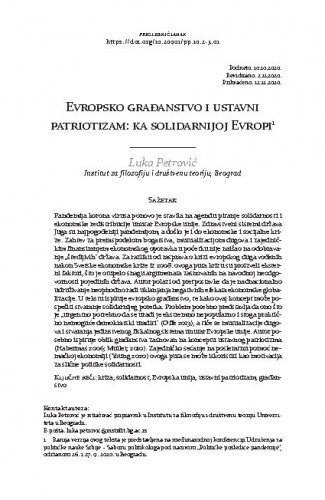Pandemija korona virusa ponovo je stavila na agendu pitanje solidarnosti i ekonomske redistribucije unutar Evropske unije. Zdravstveni sistemi država Juga su najpogođeniji pandemijom, a došlo je i do ekonomske i socijalne krize. Zahtev za preraspodelom bogatstva, mutualizacijom dugova i zajedničkim finansiranjem ekonomskog oporavka u početku nije naišao na odobravanje „štedljivih” država. Za razliku od rasprava o krizi evropskog duga vođenih nakon Svetske ekonomske krize iz 2008. ovoga puta krizu su proizveli eksterni faktori, što je otupelo snagu argumenata zasnovanih na navodnoj neodgovornosti pojedinih država. Autor polazi od pretpostavke da je nadnacionalno udruživanje neophodno radi uklanjanja negativnih efekata ekonomske globalizacije. U tekstu ispituje evropsko građanstvo, te kako ovaj koncept može pospešiti stvaranje solidarnijeg poretka. Problem posebno predstavlja da ono što je „urgentno potrebno da se uradi je ekstremno nepopularno i stoga praktično nemoguće demokratski uraditi” (Offe 2013), a tiče se mutualizacije dugova i stvaranja jedinstvenog fiskalnog sistema unutar Evropske unije. Autor posebno ispituje oblik građanstva zasnovan na konceptu ustavnog patriotizma (Habermas 2006; Muller, 2010). Zajedničko sećanje na posleratnu pomoć nemačkoj ekonomiji (Young 2020) ovoga puta se može iskoristiti kao motivacija za slične politike solidarnosti.; The coronavirus pandemic has once again put the issue of solidarity and economic redistribution within the European Union on the agenda. Unlike the discussions on the European debt crisis conducted after the World Economic Crisis of 2008, this time the crisis was produced by external factors, which blunted the strength of the arguments based on the alleged irresponsibility of certain countries. The author starts from the assumption that supranational association is necessary to remove the negative effects of economic globalization and rejects the sovereignist answers. The paper examines the notion of European citizenship, and how this concept can accelerate the creation of a more solidary order. The problem is especially the fact that “what is urgently needed to be done is also extremely unpopular and therefore democratically virtually impossible to do” (Offe, 2013). Solving the problem would include broad economic redistribution, mutualization of debts, and even the creation of a single fiscal system within the European Union. The author specifically examines the form of citizenship based on the concept of constitutional patriotism (Habermas, 2006, Muller, 2010). One of its elements, the shared memory of post-war aid to the German economy (Young, 2020), this time can be used as a motivation for similar solidarity policies.
Sažetak

 Političke perspektive : časopis za istraživanje politike : 10, 2/3 (2020) / glavna urednica Ana Matan.
Političke perspektive : časopis za istraživanje politike : 10, 2/3 (2020) / glavna urednica Ana Matan.